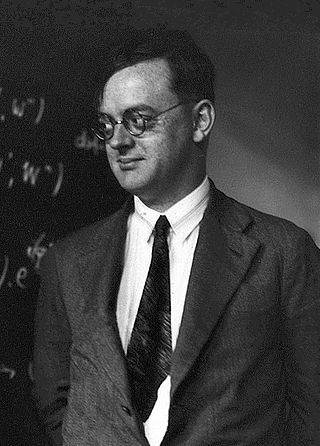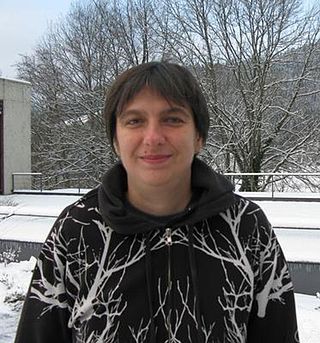In theoretical physics, the anti-de Sitter/conformal field theory correspondence is a conjectured relationship between two kinds of physical theories. On one side are anti-de Sitter spaces (AdS) that are used in theories of quantum gravity, formulated in terms of string theory or M-theory. On the other side of the correspondence are conformal field theories (CFT) that are quantum field theories, including theories similar to the Yang–Mills theories that describe elementary particles.

Ernst Pascual Jordan was a German theoretical and mathematical physicist who made significant contributions to quantum mechanics and quantum field theory. He contributed much to the mathematical form of matrix mechanics, and developed canonical anticommutation relations for fermions. He introduced Jordan algebras in an effort to formalize quantum field theory; the algebras have since found numerous applications within mathematics.

Rudolf Haag was a German theoretical physicist, who mainly dealt with fundamental questions of quantum field theory. He was one of the founders of the modern formulation of quantum field theory and he identified the formal structure in terms of the principle of locality and local observables. He also made important advances in the foundations of quantum statistical mechanics.

Karl-Henning Rehren is a German physicist who focuses on algebraic quantum field theory.
An infraparticle is an electrically charged particle together with its surrounding cloud of soft photons—of which there are an infinite number, by virtue of the infrared divergence of quantum electrodynamics. That is, it is a dressed particle rather than a bare particle. Whenever electric charges accelerate they emit Bremsstrahlung radiation, whereby an infinite number of the virtual soft photons become real particles. However, only a finite number of these photons are detectable, the remainder falling below the measurement threshold.

Ludvig Dmitrievich Faddeev was a Soviet and Russian mathematical physicist. He is known for the discovery of the Faddeev equations in the quantum-mechanical three-body problem and for the development of path-integral methods in the quantization of non-abelian gauge field theories, including the introduction of the Faddeev–Popov ghosts. He led the Leningrad School, in which he along with many of his students developed the quantum inverse scattering method for studying quantum integrable systems in one space and one time dimension. This work led to the invention of quantum groups by Drinfeld and Jimbo.

Jürgen Ehlers was a German physicist who contributed to the understanding of Albert Einstein's theory of general relativity. From graduate and postgraduate work in Pascual Jordan's relativity research group at Hamburg University, he held various posts as a lecturer and, later, as a professor before joining the Max Planck Institute for Astrophysics in Munich as a director. In 1995, he became the founding director of the newly created Max Planck Institute for Gravitational Physics in Potsdam, Germany.
In mathematical physics, the concept of quantum spacetime is a generalization of the usual concept of spacetime in which some variables that ordinarily commute are assumed not to commute and form a different Lie algebra. The choice of that algebra varies from one theory to another. As a result of this change, some variables that are usually continuous may become discrete. Often only such discrete variables are called "quantized"; usage varies.
Gerhart Lüders was a German theoretical physicist who worked mainly in quantum field theory and was well known for the discovery and a general proof of the CPT theorem. This theorem is also called the Pauli-Lüders theorem and is one of the most fundamental rules of particle physics.

Jürg Martin Fröhlich is a Swiss mathematician and theoretical physicist. He is best known for introducing rigorous techniques for the analysis of statistical mechanics models, in particular continuous symmetry breaking, and for pioneering the study of topological phases of matter using low-energy effective field theories.

Matilde Marcolli is an Italian and American mathematical physicist. She has conducted research work in areas of mathematics and theoretical physics; obtained the Heinz Maier-Leibnitz-Preis of the Deutsche Forschungsgemeinschaft, and the Sofia Kovalevskaya Award of the Alexander von Humboldt Foundation. Marcolli has authored and edited numerous books in the field. She is currently the Robert F. Christy Professor of Mathematics and Computing and Mathematical Sciences at the California Institute of Technology.
The Bousso bound captures a fundamental relation between quantum information and the geometry of space and time. It appears to be an imprint of a unified theory that combines quantum mechanics with Einstein's general relativity. The study of black hole thermodynamics and the information paradox led to the idea of the holographic principle: the entropy of matter and radiation in a spatial region cannot exceed the Bekenstein–Hawking entropy of the boundary of the region, which is proportional to the boundary area. However, this "spacelike" entropy bound fails in cosmology; for example, it does not hold true in our universe.
Luis Álvarez-Gaumé is a Spanish theoretical physicist who works on string theory and quantum gravity.

Sergio Doplicher is an Italian mathematical physicist, who mainly dealt with the mathematical foundations of quantum field theory and quantum gravity.

Roberto Longo is an Italian mathematician, specializing in operator algebras and quantum field theory.

Martin Schlichenmaier is a German - Luxembourgish mathematician whose research deals with algebraic, geometric and analytic mathematical methods which partly have relations to theoretical and mathematical physics.

Klaus Fredenhagen is a German theoretical physicist who works on the mathematical foundations of quantum field theory.
Hermann Nicolai is a German theoretical physicist and director emeritus at the Max Planck Institute for Gravitational Physics in Potsdam-Golm.
Robert Schrader was a German theoretical and mathematical physicist and professor of the Free University of Berlin. He is known for the Osterwalder–Schrader axioms.
Niklas Beisert is a German theoretical physicist, known for his research on quantum field theory and string theory.










